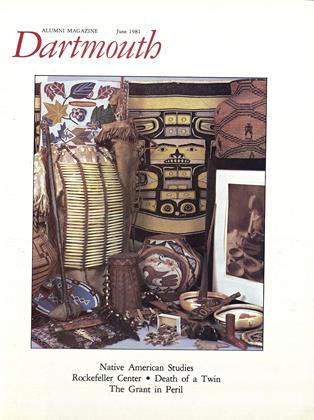When Patricia Walton, of Kittery Point, Maine, graduated this June, her academic transcript showed seven A minuses not an unusual feat for a diligent student. But, in contrast to most other 1981 graduates, these grades were the low point of Walton's academic career. In her other 26 courses she received straight A's, an achievement that merited her selection as valedictory speaker for her class. (As it turns out, three of the last four valedictory speakers have been from the state of Maine.)
A Russian language and literature major, Walton does not fit the all-work-andno-play image of a valedictorian. Well- tanned despite the springtime obligation of finishing her senior thesis on Russian author Mikhail Bulgakov, Walton readily conversed about her Dartmouth ex- perience. Admitting to studying a great deal during her first two years, she quickly pointed out she "spent a lot of time talking to people after that," mostly as she bounced around Europe.
Walton spent the summer after her sophomore year on a foreign-study program in Leningrad, followed by fall in Toulouse, France, and winter in Bourges as a teaching assistant. After two terms in Hanover, she returned to Leningrad and then participated in a Language Study Abroad program in Mainz, Germany. Asked whether she would want to change her approach to Dartmouth if she were to start over again, Walton replied, "It would be nice to have taken Chinese but I don't think there was room." As a freshman, Walton was on the sailing team but later gave it up: "I couldn't do four years of sports and go abroad as much as I did, and I didn't want to trade my off-campus programs for the schedule needed to par- ticipate in athletics."
A little surprised by her own academic success, Walton always assumed there were others doing better than she. As something of an explanation, she noted, "You can do well at anything if you are interested enough and are willing to work at it." Walton's interest in what she has been doing is obvious, whether it was researching how censorship affects Russian literature in the original and translation or trying to understand the Russians and American reactions to them.
"People here think the people there are out to get us," Walton observed. "The Russian people don't want to go anywhere else they have an intense love for their country, though not necessarily for the government. They are Russians, not Soviets." She added, "I know Russians as nice as any Americans. They are people exactly like us. We are just the same. I don't understand why we have to fight over it."
Walton will return to Leningrad next year to examine Soviet demography and population policy. Afterwards, she hopes to complete a combined four-year program in law and international relations with an eventual career objective of international law or foreign service.
Valedictory speaker Walton: practicallya monopoly lately for the state of Maine.
 View Full Issue
View Full Issue
More From This Issue
-
 Feature
FeatureDeath and Reunion: the loss of a twin
June 1981 By George L. Engel -
 Cover Story
Cover StoryThe Long-Deferred Promise
June 1981 By Shelby Grantham -
 Feature
FeatureRockefeller Center: the ideal of reflection and action
June 1981 By Donald McNemar -
 Feature
FeatureA Dull Little Bug Imperils the College Grant
June 1981 By Ted Winterer -
 Article
ArticleDartmouth Authors
June 1981 -
 Article
ArticleThe National Committee
June 1981
Article
-
 Article
ArticleTHE LAMBS AND THE WOLVES
January, 1914 -
 Article
ArticleFaculty Articles
MAY 1959 -
 Article
ArticleUnconsenting College
November 1979 -
 Article
ArticleTHE FOOTBALL RULES OF THE NEXT SEASON
APRIL 1906 By E. K. Hal '92 -
 Article
ArticleThayer School
October 1946 By John H. Minnich '29 -
 Article
ArticleScience and General Education
May 1947 By ROY P. FORSTER


